from Apr. 21, 1865
Funeral Obsequies of President Lincoln
-
Full Title
Funeral Obsequies of President Lincoln
-
Description
This article was published in the Union Vedette, a newspaper published by United States soldiers stationed at Camp Douglas in Salt Lake City, Utah. It discusses a meeting in which the Utah territory's federal, civil, and military officials adopted multiple resolutions related to the Lincoln assassination and planned for the city's memorial service. It expresses grief over Lincoln's death and extols his "integrity and ability as a magistrate," while endorsing Andrew Johnson as the new president.
-
Transcription
Funeral Obsequies of President Lincoln
At a meeting of the Federal, Civil and Military officials of Utah, held at the Executive in Great Salt Lake City, April 18th at two P.M., Hon. J. Duane Doty, Governor, was called to the chair, Capt. C.H Hemstead and T.B. H. Stenhouse, Esq., appointed Secretaries.
After preliminary consultation and expression of feeling over the sad event which called this meeting together, the following resolutions. presented by Hon. Chief Justice Titas, were unanimously adopted:
Whereas, the death by assassination of our beloved President. has wrung the hearts of all good men with grief;
Whereas, the serious wounding, by lawless violence, of our esteemed and honored Secretary of State, and his two sons, mingles with the sorrow of actual bereavement, the painful apprehension of further heart-rending loss and;
Whereas, also, in this our hour of calamity, we may not inappropriately seek that relief which affliction finds in outward expression! Therefore,
Resolved. That we cannot suppress the profound sorrow, with which we lament the untimtely death of our beloved President Abraham Lincoln, whose integrity and ability as a magistrate had secured for him the confidence of his country and whose genial virtues as a man, had endeared him to humanity itself:
Resolved. That with unaffected grief for our lamented President, is mingled the poignant regret, that he has not been spared to see and enjoy the fruition of that peace which has his labors had done so much to secure for his country, and which we believe is not far distant;
Resolved, That while we thus lament for our friend, the exemplary husband and father. we cannot forget the stricken family, but with a feeling of unaffected condolence humbly invoke for them that support, which transcends all human woe, in the divine power of its consolation;
Resolved, That we devotedly hope that the wounds of our able and honored Secretary of State William H. Seward, and his two sons, may none of them prove mortal but that they may all soon be restored to health. and long spared for further useful service, to our common country;
Resolved. That we have the fullest confidence in our President Andrew Johnson, our own and the Nation’s choice, as he was for the second. prepared by labor and trial as he was for the first office in government. and to which he is thus translated by the peration of the Constitution and the permission of a tremendous Providence.
Resolved. That a committee of five be appointed on the part of the Federal offices to confer with a committee of like number on the part of the city authorities. to make arrangements for suitable religious exercises to be held at the Tabernacle, April 19th, at twelve o’-clock, M.
Col. J.C. Little informed the meeting that Elder Amasa M. Lyman had been selected by city authorities to deliver an address at the Tabernacle.
Oh motion, it was unanimously resolved the Rev. Normal McLeod be also invited to deliver an eulogium on the life, character and illustrious services of the late President, on the same occasion and at-the-same place.
In accordance with the foregoing resolutions the following gentlemen were appointed by the Chair as the Committee of Arrangements. viz: Hon. Chief Justice John Titus, Col. O. H. Irish, Capt Chas H. Hempstead, Col. Robt. T. Burton and Col. I C Little.
Following is the committee appointed on behalf of the city authorities. viz: Hon. Mayor Smoot, Alderman Sheets, Alderson Raleigh, Thos. McKeon and N. H. Felt, E-qs.
On motion, the Secretaries were instructed to transmit a copy of the proceedings of this meeting to the City Council, and that public notice be given of the exercises at the Tabernacle.
J. DUANE DOTY, President.
T.B.H. Stenhouse,
Chas H. Hempstead } Secretaries
[Transcription by Alicia B., Ford's Theatre Society, and Janet Scanlon.]
-
Source
Utah Digital Newspapers Contributed by McKayla Herron, M.A. Student in Public History, West Virginia University
-
Rights
This item is in the public domain and may be reproduced and used for any purpose, including research, teaching, private study, publication, broadcast or commercial use, with proper citation and attribution.
-
Tags
-
Cite this Item
Union Vedette. "Funeral Obsequies of President Lincoln". Union Vedette. Remembering Lincoln. Web. Accessed December 14, 2025. https://rememberinglincoln.fords.org/node/1211
-
Creator
Union Vedette
-
Publisher
Union Vedette
-
Date
April 21, 1865
from Apr. 21, 1865
Funeral Obsequies of President Lincoln
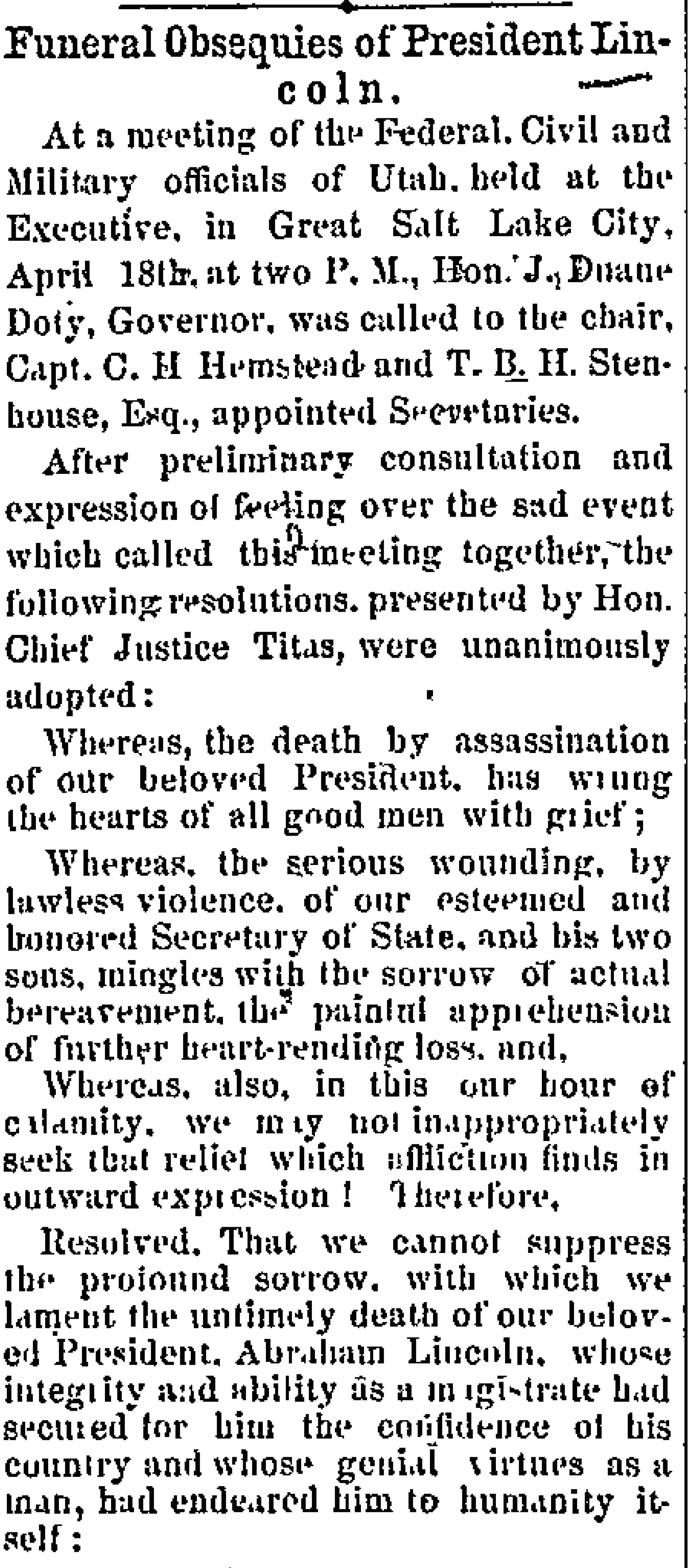
-
Description
This article was published in the Union Vedette, a newspaper published by United States soldiers stationed at Camp Douglas in Salt Lake City, Utah. It discusses a meeting in which the Utah territory's federal, civil, and military officials adopted multiple resolutions related to the Lincoln assassination and planned for the city's memorial service. It expresses grief over Lincoln's death and extols his "integrity and ability as a magistrate," while endorsing Andrew Johnson as the new president.
-
Source
Utah Digital Newspapers Contributed by McKayla Herron, M.A. Student in Public History, West Virginia University
-
Rights
This item is in the public domain and may be reproduced and used for any purpose, including research, teaching, private study, publication, broadcast or commercial use, with proper citation and attribution.
-
Creator
Union Vedette
-
Publisher
Union Vedette
-
Date
April 21, 1865
from May. 9, 1865
From the Legation of His Imperial Majesty the Shah of Persia
-
Full Title
From the Legation of His Imperial Majesty the Shah of Persia
-
Description
A message from the legation of the Shah of Persia offering condolences on behalf of the leader and the people of Persia. The Shah transmitted this message via telegram to his emissary Suleiman Khan in Paris, who passed it along to the new President as a gesture of goodwill. Such a message demonstrates just how widely felt the impacts of Lincoln's death were.
-
Transcription
Transcription available through the Department of State Office of the Historian
-
Source
-
Rights
This item is in the public domain and may be reproduced and used for any purpose, including research, teaching, private study, publication, broadcast or commercial use, with proper citation and attribution.
-
Tags
-
Cite this Item
Suleiman Khan. "From the Legation of His Imperial Majesty the Shah of Persia". Remembering Lincoln. Web. Accessed December 14, 2025. https://rememberinglincoln.fords.org/node/1206
-
Creator
Suleiman Khan
-
Date
May 09, 1865
from May. 9, 1865
From the Legation of His Imperial Majesty the Shah of Persia
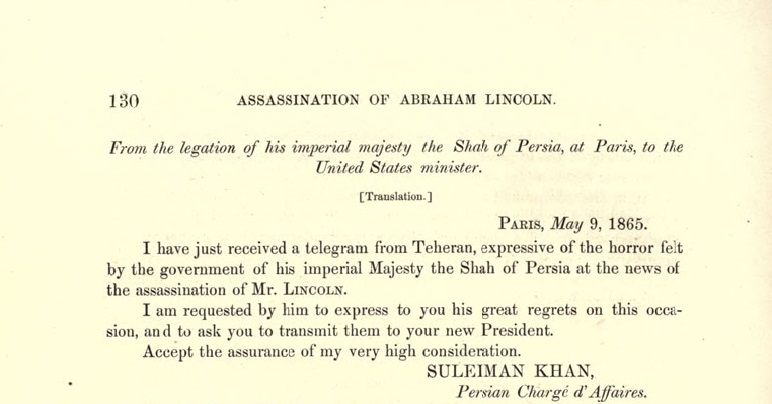
-
Description
A message from the legation of the Shah of Persia offering condolences on behalf of the leader and the people of Persia. The Shah transmitted this message via telegram to his emissary Suleiman Khan in Paris, who passed it along to the new President as a gesture of goodwill. Such a message demonstrates just how widely felt the impacts of Lincoln's death were.
-
Source
-
Rights
This item is in the public domain and may be reproduced and used for any purpose, including research, teaching, private study, publication, broadcast or commercial use, with proper citation and attribution.
-
Creator
Suleiman Khan
-
Date
May 9, 1865
from May. 2, 1865
Inhabitants of Zurich
-
Full Title
Inhabitants of Zurich
-
Description
A letter of condolences written to the US Government by a committee of residents from the Swiss city of Zurich. The committee praises the Union victory over the Confederacy, noting its impacts on not only the United States but also "all mankind". While mourning Lincoln, the document makes comparisons between Lincoln's impact and the previous global political impact of the Revolutionary War and George Washington. This letter provides a window into global reactions to the end of the war, as well as international opinions on what the role of a post-war United States would look like.
-
Transcription
Transcription is available via the Department of State Office of the Historian.
-
Source
-
Rights
This item is in the public domain and may be reproduced and used for any purpose, including research, teaching, private study, publication, broadcast or commercial use, with proper citation and attribution.
-
Tags
-
Cite this Item
O. Bulle. "Inhabitants of Zurich". Remembering Lincoln. Web. Accessed December 14, 2025. https://rememberinglincoln.fords.org/node/1205
-
Creator
O. Bulle
-
Date
May 2, 1865
from May. 2, 1865
Inhabitants of Zurich
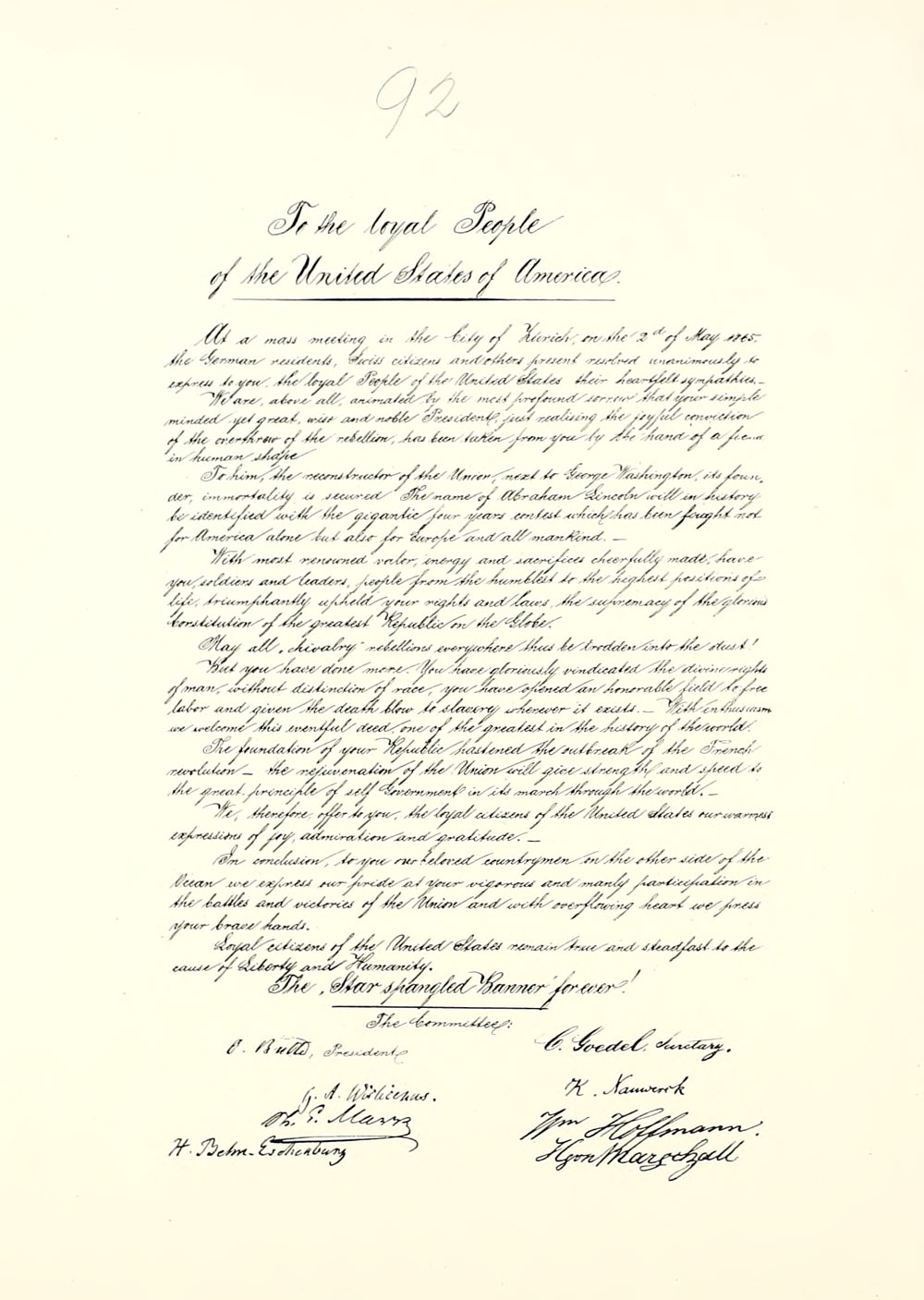
-
Description
A letter of condolences written to the US Government by a committee of residents from the Swiss city of Zurich. The committee praises the Union victory over the Confederacy, noting its impacts on not only the United States but also "all mankind". While mourning Lincoln, the document makes comparisons between Lincoln's impact and the previous global political impact of the Revolutionary War and George Washington. This letter provides a window into global reactions to the end of the war, as well as international opinions on what the role of a post-war United States would look like.
-
Source
-
Rights
This item is in the public domain and may be reproduced and used for any purpose, including research, teaching, private study, publication, broadcast or commercial use, with proper citation and attribution.
-
Creator
O. Bulle
-
Date
May 2, 1865
from Apr. 18, 1865
Office of Agent For C.S. Prisoners
-
Full Title
Office of Agent For C.S. Prisoners
-
Description
Letter sent by a Confederate prisoner of war named WM. S. Hawkins. Hawkins was a Confederate army colonel who was confined to Camp Chase, one of the largest POW camps in the Northern states. Hawkins expresses his regrets in regards to President Lincoln's fate, while voicing a desire for a post-war world in which the country was unified under principles of justice, mercy, and kindness.
-
Transcription
Office of Agent for C.S Prisoners, Camp Chase, Ohio, April, 18th 1865.
I desire, through your columns, to express my profound abhorrence of the deeds resulting in the death of President Lincoln. I wish also to mention that in passing through the prisons, where are still confined several thousand of my comrades, I heard of no one so fallen from the level of our common humanity as to be in any sense gratified at this atrocious murder. The sentiment on every side was that of indignation at so cowardly an attempt, and of regret at its successful completion.
In the name of Right, let the obloquy and the punishment fall in united horror upon the guilty, but not upon men who have had neither part nor lot in the matter; who, in other affairs, may have erred in judgement, but certainly not in heart, since countless sacrifices attest their sincerity; and whose strength, in case of ultimate Federal success, can be merged once more in the common resources far more readily by the Divine policy of brotherly kindness, than by any exercise of bitter and vindictive feeling.
Over the ark of a wise Government two seraphs bend - one of these is clear-eyed Justice, but the other is warm-hearted Mercy.
I am, sirs, very respectfully, your obedient servant,
WM. S. HAWKINS
Colonel, C.S.A. -
Rights
This item is in the public domain and may be reproduced and used for any purpose, including research, teaching, private study, publication, broadcast or commercial use, with proper citation and attribution.
-
Tags
-
Cite this Item
WM. S. Hawkins. "Office of Agent For C.S. Prisoners". The Louisville Daily Journal. Remembering Lincoln. Web. Accessed December 14, 2025. https://rememberinglincoln.fords.org/node/1204
-
Creator
WM. S. Hawkins
-
Publisher
The Louisville Daily Journal
-
Date
April 18, 1865
from Apr. 18, 1865
Office of Agent For C.S. Prisoners
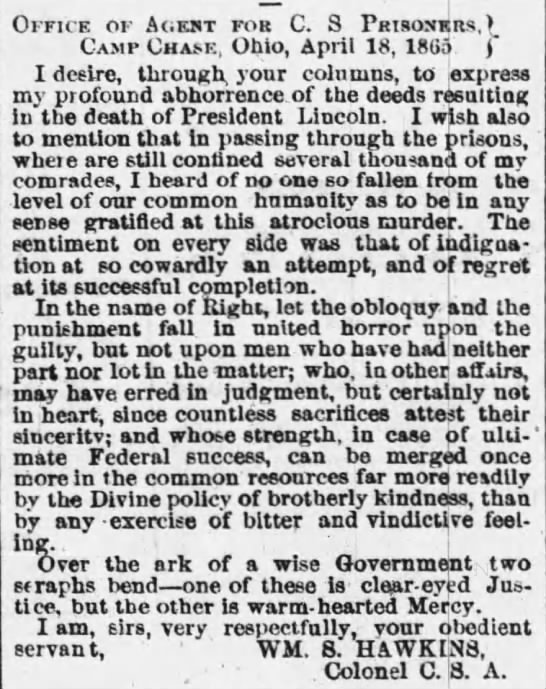
-
Description
Letter sent by a Confederate prisoner of war named WM. S. Hawkins. Hawkins was a Confederate army colonel who was confined to Camp Chase, one of the largest POW camps in the Northern states. Hawkins expresses his regrets in regards to President Lincoln's fate, while voicing a desire for a post-war world in which the country was unified under principles of justice, mercy, and kindness.
-
Rights
This item is in the public domain and may be reproduced and used for any purpose, including research, teaching, private study, publication, broadcast or commercial use, with proper citation and attribution.
-
Creator
WM. S. Hawkins
-
Publisher
The Louisville Daily Journal
-
Date
April 18, 1865
from May. 1, 1865
International Expressions of Condolence and Sympathy
-
Full Title
The Assassination of Abraham Lincoln, Late President of the United States of America…Expressions of Condolence and Sympathy Inspired by These Events
-
Description
The U.S. State Department compiled and published a collection of condolences it had received following the Abraham Lincoln's assassination.
-
Source
-
Rights
This item is in the public domain and may be reproduced and used for any purpose, including research, teaching, private study, publication, broadcast or commercial use, with proper citation and attribution.
-
Tags
-
Cite this Item
United States Department of State. "The Assassination of Abraham Lincoln, Late President of the United States of America…Expressions of Condolence and Sympathy Inspired by These Events". U.S. Government Printing Office, . Remembering Lincoln. Web. Accessed December 14, 2025. https://rememberinglincoln.fords.org/node/1191
-
Creator
United States Department of State
-
Publisher
U.S. Government Printing Office,
-
Date
1867
from May. 1, 1865
The Assassination of Abraham Lincoln, Late President of the United States of America…Expressions of Condolence and Sympathy Inspired by These Events
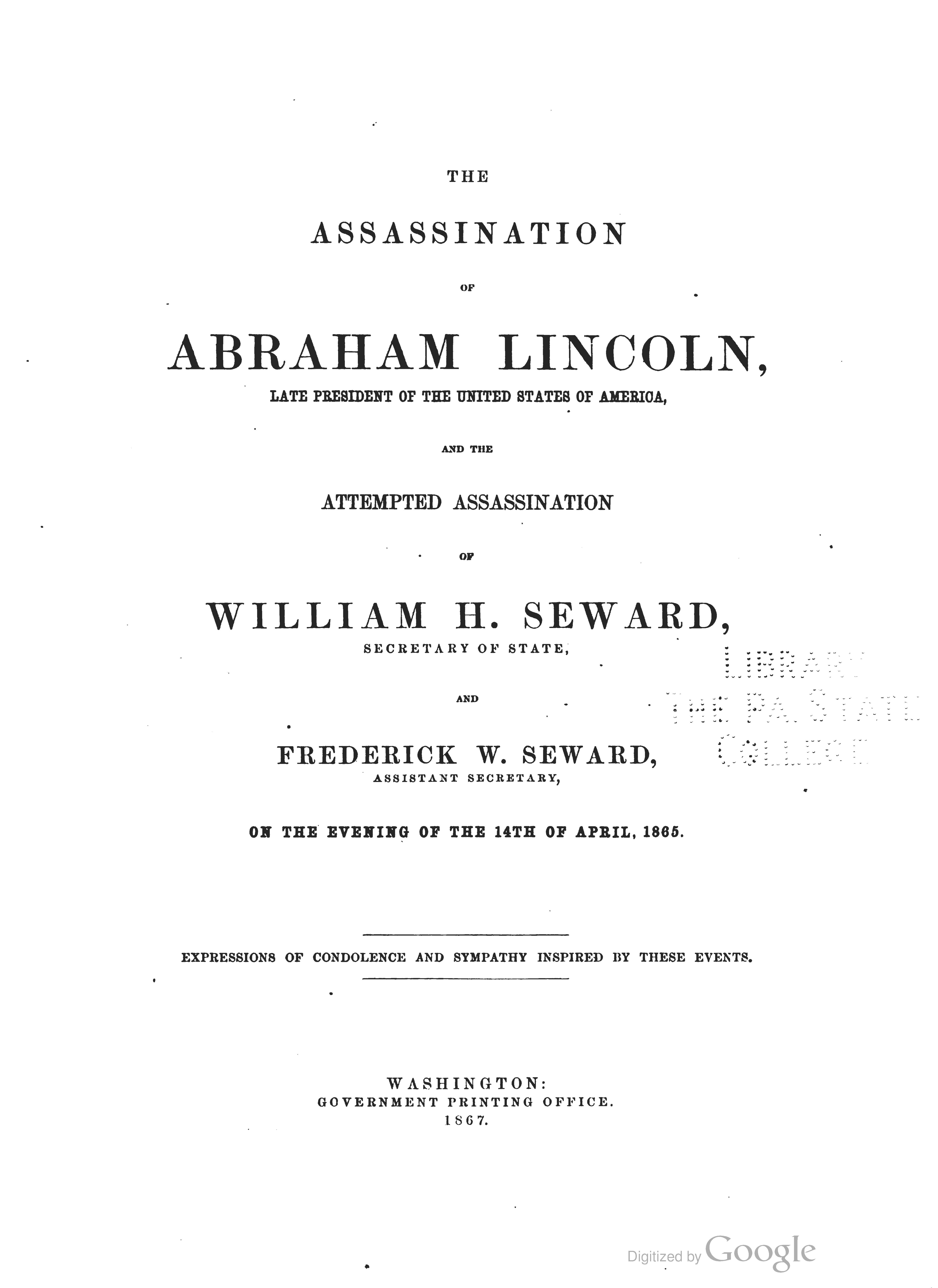
-
Description
The U.S. State Department compiled and published a collection of condolences it had received following the Abraham Lincoln's assassination.
-
Source
-
Rights
This item is in the public domain and may be reproduced and used for any purpose, including research, teaching, private study, publication, broadcast or commercial use, with proper citation and attribution.
-
Creator
United States Department of State
-
Publisher
U.S. Government Printing Office,
-
Date
May 1, 1865
from Aug. 31, 1865
A Letter from Mary Todd Lincoln to Mrs. Anson G. Henry
-
Full Title
A Letter from Mary Todd Lincoln to Mrs. Anson G. Henry
-
Description
A Letter from Mary Todd Lincoln to Mrs. Anson G. Henry. Mrs. Henry's husband was a friend of Abraham Lincoln and the Surveyor General of Washington Territory at the time of Lincoln's death. Dr. Henry died on July 30, 1865. Mary Lincoln's letter expresses her sympathy for Mrs. Henry and her own grief for the death Dr. Henry and her husband.
-
Transcription
Chicago, Aug 31st 1865.
My very dear Mrs. Henry,
Bowed down and broken hearted, and feeling so deeply for you, in your agonizing bereavement, I feel justified in approaching you at this time when we all feel I’ll alike crushed.
We’ve have both been called upon to resign, to our Heavenly Father, two of the best men & the most devoted husbands that too unhappy women ever possessed.
The terrible news that our beloved friend who so sympathized with us in our irreparable loss, is gone, has been received by us, only a day or two since. My sons and myself have been overcome, by the startling and heart rendering intelligence. We consider that we have lost our best & dearest friend. It has been my most ardent wish that Dr. Henry should have received an appointment in Washington, it would have been a great comfort to us, in our own overwhelming sorrow to have had you both near us. In this great trial, it is difficult, to be taught resignation, the only comfort, that remains to us is the blessed consolation, that our beloved ones, are rejoicing in their Heavenly Home, free from all earthly trials & in the holy presence of God & his angels, are singing the praises of the Redeemer. I long, to lay my own weary head, down to rest, by the side of my darling husband. I pray God, to grant me sufficient grace, to await his time, for I long, to be at rest. Without my idolized husband, I do not wish to remain on earth.
Mr. Wm. T. Henry, called a day or two since. I was confined to my bed & did not see him. Robert saw him & he left, your telegram. Robert, immediately, wrote on to Washington, urging & pleading, for the appointment, of your son in law. We pray & trust the appeal, will be granted. You have no one, my dear friend, who could possibly feel for you, as I do, your grief is mine, in it, I am living over my own disconsolate state & the gratitude we feel for the dear Doctor’s recent sympathy, for us, in all things together with the great love, we all bore him, makes your troubles my own. How much, I wish, you lived nearer to us. We could then, weep, together over our dreary lot. The world, without my beloved husband & our best friend, is a sad and lonely place enough.
Our poor little family, would be a gloomy picture, for any one to see, who has a heart to feel. It was a great trial, to me, when Dr. Henry left here in June, that I was unable to have access to some boxes, stored in the warehouse, where was deposited a cane of my husband’s, a large family Bible & some other things design for presentation, to the Dr. So soon as I can get to them, I shall avail myself, of the first opportunity, of sending them to you. I can offer you in conclusion, of this very sad letter, my dear Mrs. Henry, very little consolation, for I am so weary & heavy laden myself, over everything, concerning us both. I trust you will write me to me, for you are very dear to me, now & ever.
With regards to your family, I remain always
Your attached friend,
Mary Lincoln.
[Transcription by Alicia B., Ford's Theatre Society, and Janet Scanlon.] -
Source
Special Collections Research Center, University of Chicago Library
-
Rights
This item is in the public domain and may be reproduced and used for any purpose, including research, teaching, private study, publication, broadcast or commercial use, with proper citation and attribution.
-
Tags
-
Cite this Item
Mary Todd Lincoln. "A Letter from Mary Todd Lincoln to Mrs. Anson G. Henry". Remembering Lincoln. Web. Accessed December 14, 2025. https://rememberinglincoln.fords.org/node/1178
-
Creator
Mary Todd Lincoln
-
Date
August 31, 1865
from Aug. 31, 1865
A Letter from Mary Todd Lincoln to Mrs. Anson G. Henry
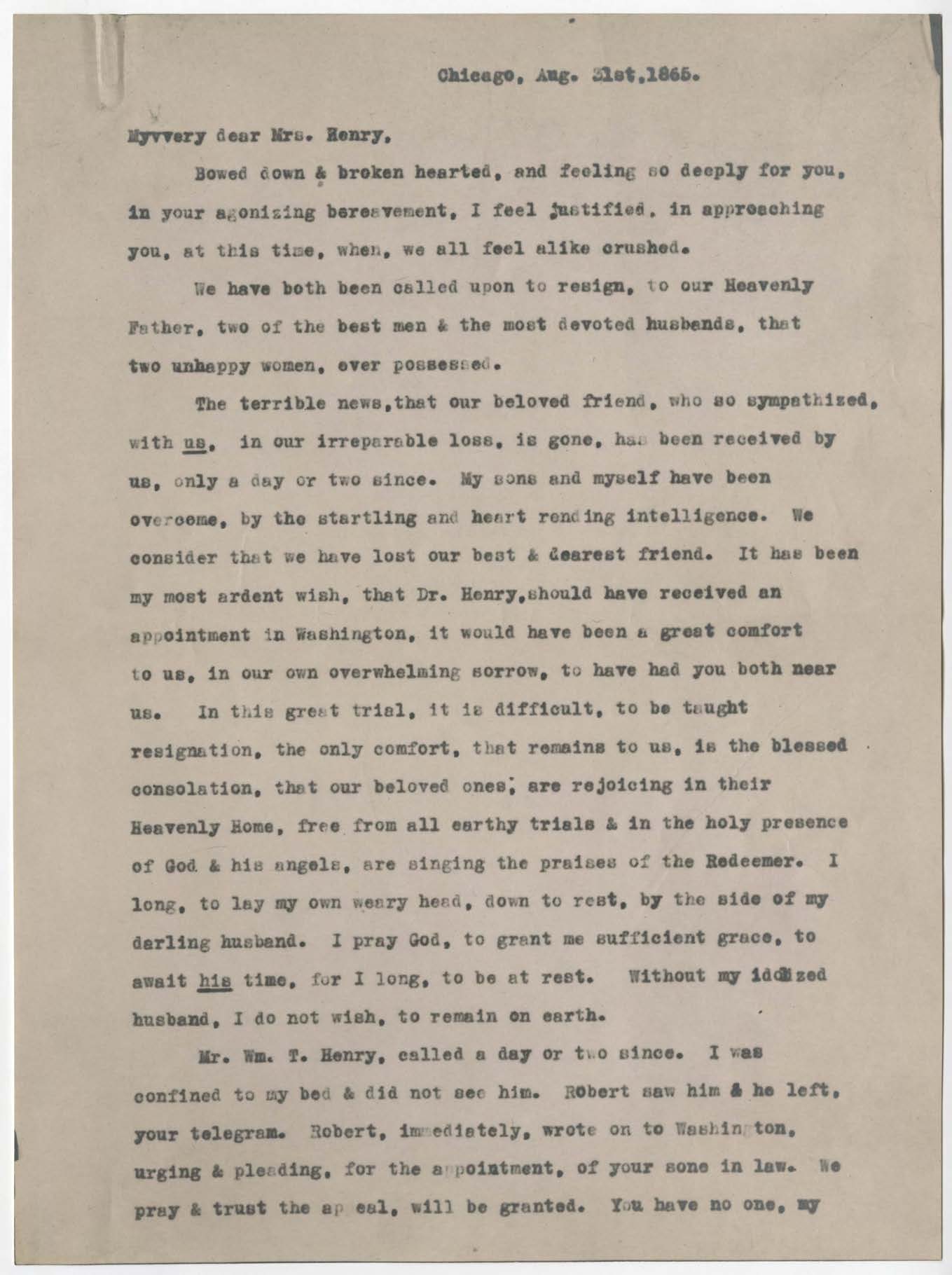
-
Description
A Letter from Mary Todd Lincoln to Mrs. Anson G. Henry. Mrs. Henry's husband was a friend of Abraham Lincoln and the Surveyor General of Washington Territory at the time of Lincoln's death. Dr. Henry died on July 30, 1865. Mary Lincoln's letter expresses her sympathy for Mrs. Henry and her own grief for the death Dr. Henry and her husband.
-
Source
Special Collections Research Center, University of Chicago Library
-
Rights
This item is in the public domain and may be reproduced and used for any purpose, including research, teaching, private study, publication, broadcast or commercial use, with proper citation and attribution.
-
Creator
Mary Todd Lincoln
-
Date
August 31, 1865
from May. 17, 1865
Resolution on the "Death of the President" by the General Conference of Seventh Day Adventists Session
-
Full Title
Resolution on the "Death of the President" by the General Conference of Seventh Day Adventists Session
-
Description
This is an excerpt from the Session Minutes of the 1865 General Conference of Seventh-day Adventist, lamenting Lincoln’s death. The Session took place on May 17, 1865 and the minutes were published in the Advent Review and Sabbath Herald in the May 23, 1865 issue. The church’s Secretary was also an earlier editor of the Advent Review and Sabbath Herald and thus pasted the minutes into the Records after they had been published.
-
Transcription
Third Annual Meeting.
May 17. 1865.
DEATH OF THE PRESIDENT
Whereas, Abraham Lincoln, the noble-minded and upright chief magistrate of this nation, has fallen by the hand of an assassin,
Resolved, That we hereby record our deep distress at the loss of this "prince and great man," 2 Sam. iii, 27-28, who was stricken down by his enemies at the very moment when he was studying how to forgive them all, and that we recognize in this most atrocious crime the true character of the slaveholders' rebellion. -
Source
-
Rights
This item is in the public domain and may be reproduced and used for any purpose, including research, teaching, private study, publication, broadcast or commercial use, with proper citation and attribution.
-
Tags
-
Cite this Item
General Conference of Seventh-day Adventists. "Resolution on the "Death of the President" by the General Conference of Seventh Day Adventists Session ". Remembering Lincoln. Web. Accessed December 14, 2025. https://rememberinglincoln.fords.org/node/1132
-
Creator
General Conference of Seventh-day Adventists
-
Date
May 17, 1865
from May. 17, 1865
Resolution on the "Death of the President" by the General Conference of Seventh Day Adventists Session

-
Description
This is an excerpt from the Session Minutes of the 1865 General Conference of Seventh-day Adventist, lamenting Lincoln’s death. The Session took place on May 17, 1865 and the minutes were published in the Advent Review and Sabbath Herald in the May 23, 1865 issue. The church’s Secretary was also an earlier editor of the Advent Review and Sabbath Herald and thus pasted the minutes into the Records after they had been published.
-
Source
-
Rights
This item is in the public domain and may be reproduced and used for any purpose, including research, teaching, private study, publication, broadcast or commercial use, with proper citation and attribution.
-
Creator
General Conference of Seventh-day Adventists
-
Date
May 17, 1865
from Apr. 25, 1865
Sir Charles Hastings Doyle to Ulysses S. Grant
-
Full Title
Sir Charles Hastings Doyle to Ulysses S. Grant
-
Description
In this letter from Sir Charles Hastings Doyle, a friend of Ulysses S. Grant and major-general in command of British troops in the Atlantic area, Doyle expresses his sorrow over the assassination of Lincoln. Doyle also goes on to thank Grant for his hospitality while visiting him in Center Point, Virginia and invites Grant and his wife to visit his home in Halifax, Nova Scotia.
-
Transcription
Pray remember me most kindly to Mrs. Grant and all of your staff.
Halifax, Nova Scotia
April 25th, 1865
My Dear General,
I only returned yesterday from the Island of Bermuda, a distant part of my command, and heard, for the first time, on landing, of the glorious termination(for so it may now be called,) of your campaign against Rebeldom, and also the dreadful intelligence of the assassination of the President and attempts to murder both Mr. Seward and his son, which I heard with dismay and sorrow. Each and all of them having treated me with so much kindness upon both occasions of my visiting Washington - There seems to me to be every probability of the recovery of the two latter, and I hope if their lives are spared, you will kindly, when they are well enough to see you, express to them my very sincere condolences upon all the sufferings they have undergone but, the chief cause for my taking up my pen is, to offer you my very sincere congratulations upon your continuous and glorious successes, How much I should have liked to remain another fortnight with you to have been an eye witness of this wind up of your Campaign. You have gained imperishable honor and glory, and I hope you will live to enjoy them for many a long year to come - In conclusion I have only to remind you of your promise to pay me a visit, and to bring Mrs. Grant with you, that I may have an opportunity of repaying, in part at any rate, the kindness and hospitality you so obligingly bestowed upon me - I hope, the campaign being now over, there can be no doubt of your being able to carry your promise into effect - when you are able to make up your mind upon the subject you must let me know, that I may not be absent from home when you come
-Yours Sincerely Hastings Doyle General -
Source
-
Rights
This item is in the public domain and may be reproduced and used for any purpose, including research, teaching, private study, publication, broadcast or commercial use, with proper citation and attribution.
-
Tags
-
Cite this Item
Sir Charles Hastings Doyle. "Sir Charles Hastings Doyle to Ulysses S. Grant". Remembering Lincoln. Web. Accessed December 14, 2025. https://rememberinglincoln.fords.org/node/1130
-
Creator
Sir Charles Hastings Doyle
-
Date
April 25, 1865
from Apr. 25, 1865
Sir Charles Hastings Doyle to Ulysses S. Grant
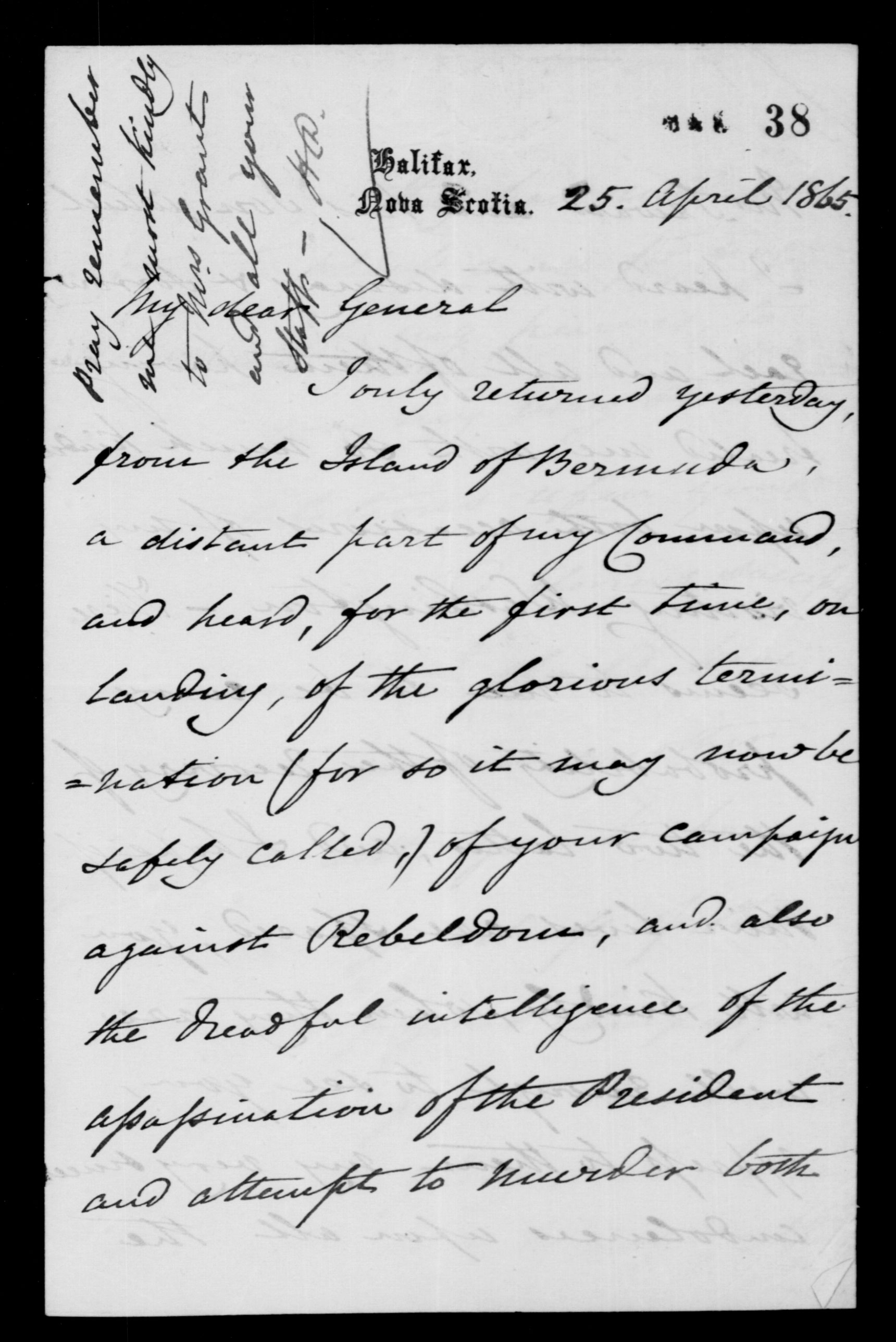
-
Description
In this letter from Sir Charles Hastings Doyle, a friend of Ulysses S. Grant and major-general in command of British troops in the Atlantic area, Doyle expresses his sorrow over the assassination of Lincoln. Doyle also goes on to thank Grant for his hospitality while visiting him in Center Point, Virginia and invites Grant and his wife to visit his home in Halifax, Nova Scotia.
-
Source
-
Rights
This item is in the public domain and may be reproduced and used for any purpose, including research, teaching, private study, publication, broadcast or commercial use, with proper citation and attribution.
-
Creator
Sir Charles Hastings Doyle
-
Date
April 25, 1865
from Jul. 4, 1865
Colored People's Educational Monument Association Celebration
-
Full Title
Celebration by the Colored People's Educational Monument Association in Memory of Abraham Lincoln
-
Description
On July 4, 1865--the first Independence Day after Lincoln's assassination--the Colored People's Educational Monument Association held a celebration in Washington, D.C., in commemoration of Lincoln, featuring speeches by prominent individuals such as Elder D.W. Anderson, the pastor of Washington's Nineteenth Street Baptist Church, William Howard Day, Senator Henry Wilson of Massachusetts, Senator Michael Hahn of Louisiana, and General Edgar Gregory. The speakers reflected on what the past year's events had meant.
-
Source
-
Rights
This item is in the public domain and may be reproduced and used for any purpose, including research, teaching, private study, publication, broadcast or commercial use, with proper citation and attribution.
-
Tags
-
Cite this Item
Colored People's Educational Monument Association. "Celebration by the Colored People's Educational Monument Association in Memory of Abraham Lincoln". McGill & Witherow. Remembering Lincoln. Web. Accessed December 14, 2025. https://rememberinglincoln.fords.org/node/1128
-
Creator
Colored People's Educational Monument Association
-
Publisher
McGill & Witherow
-
Date
July 4, 1865
from Jul. 4, 1865
Celebration by the Colored People's Educational Monument Association in Memory of Abraham Lincoln
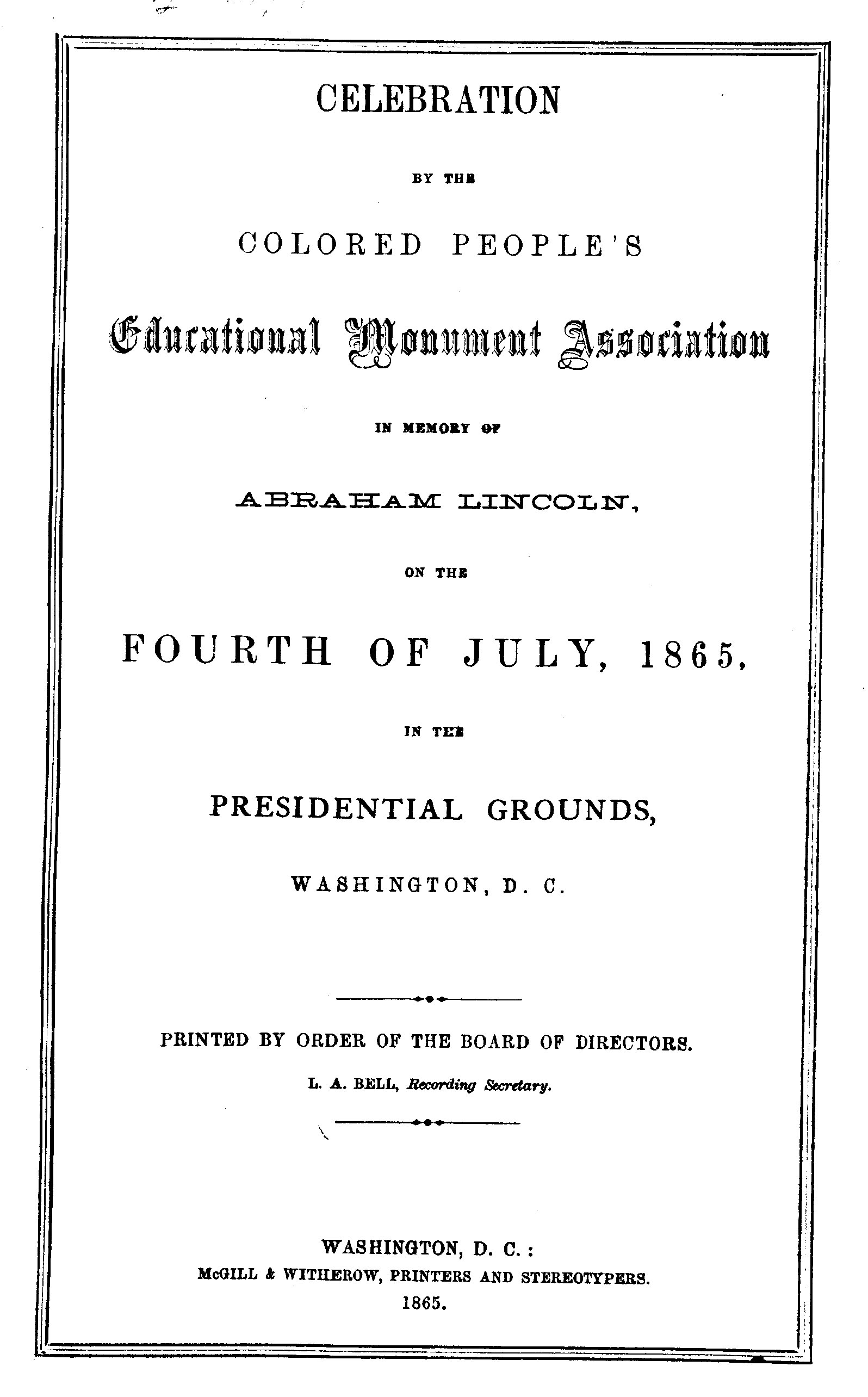
-
Description
On July 4, 1865--the first Independence Day after Lincoln's assassination--the Colored People's Educational Monument Association held a celebration in Washington, D.C., in commemoration of Lincoln, featuring speeches by prominent individuals such as Elder D.W. Anderson, the pastor of Washington's Nineteenth Street Baptist Church, William Howard Day, Senator Henry Wilson of Massachusetts, Senator Michael Hahn of Louisiana, and General Edgar Gregory. The speakers reflected on what the past year's events had meant.
-
Source
-
Rights
This item is in the public domain and may be reproduced and used for any purpose, including research, teaching, private study, publication, broadcast or commercial use, with proper citation and attribution.
-
Creator
Colored People's Educational Monument Association
-
Publisher
McGill & Witherow
-
Date
July 4, 1865
from May. 16, 1865
Department of Foreign Relations and Government - Mexican Response to Lincoln Assassination
-
Full Title
Department of Foreign Relations and Government - Mexican Response to Lincoln Assassination
-
Description
In this official letter from the exiled Mexican government, Sebastián Lerdo de Tejada, the minister of foreign affairs, notifies the United States of their remorse for the death of President Abraham Lincoln. The letter says the Mexican government will fly flags at half mast and wear mourning attire for nine days to honor Abraham Lincoln. Lerdo de Tejada served as second in command to exiled Mexican President Benito Juarez during the "French Intervention" which began in 1861. The French, backed by conservatives and nobility in Mexico, tried to overthrow Mexican President Benito Juarez. Juarez set up his government in exile in northern Mexico, in Chihuahua City, and eventually won the war in 1867.
-
Transcription
Hon. William H. Seward, &c.
_____
[Enclosure No. 1. – Translation.]
[Official.]
DEPARTMENT OF FOREIGN RELATIONS AND GOVERNMENT—DEPARTMENT OF GOVERNMENT, FIRST BUREAU.
[Circular.]
The official confirmation has been received that the President of the United States of America, Abraham Lincoln, died at Washington, at seven o’clock and twenty-two minutes, on the morning of the 15th day of April last, in consequence of the wound inflicted upon him by an assassin at half past nine o’clock on the previous night. The deplorable end of President Lincoln is a cause of great regret to the government of the Mexican republic, and to all its good citizens, by reason of his eminent personal qualities and because, during his administration, the government of the United States has continued in the most friendly relations with that of the Mexican republic in the difficult state of affairs thereof.
With the view that the manifestations of the public sorrow for that end event may be adopted, the citizen President directs that the national flag be hoisted at half-mast upon all the public buildings and at all the military stations during the day subsequent to the reception of this circular, and that all the authorities, functionaries, and employés, both civil and military, clothe themselves in mourning during nine days.
Independence and liberty! Chihuahua, May 16, 1865.
LERDO DE TEJADA
The Citizen Governor of the State of ——— .
[Transcription by: Ricarda H., Dr. Susan Corbesero’s Class, Ellis School, Pittsburgh, Pennsylvania] -
Source
Google Books
-
Rights
This item is in the public domain and may be reproduced and used for any purpose, including research, teaching, private study, publication, broadcast or commercial use, with proper citation and attribution.
-
Tags
-
Cite this Item
Sebastián Lerdo de Tejada. "Department of Foreign Relations and Government - Mexican Response to Lincoln Assassination". Government Printing Office. Remembering Lincoln. Web. Accessed December 14, 2025. https://rememberinglincoln.fords.org/node/1124
-
Creator
Sebastián Lerdo de Tejada
-
Publisher
Government Printing Office
-
Date
May 16, 1865
from May. 16, 1865
Department of Foreign Relations and Government - Mexican Response to Lincoln Assassination
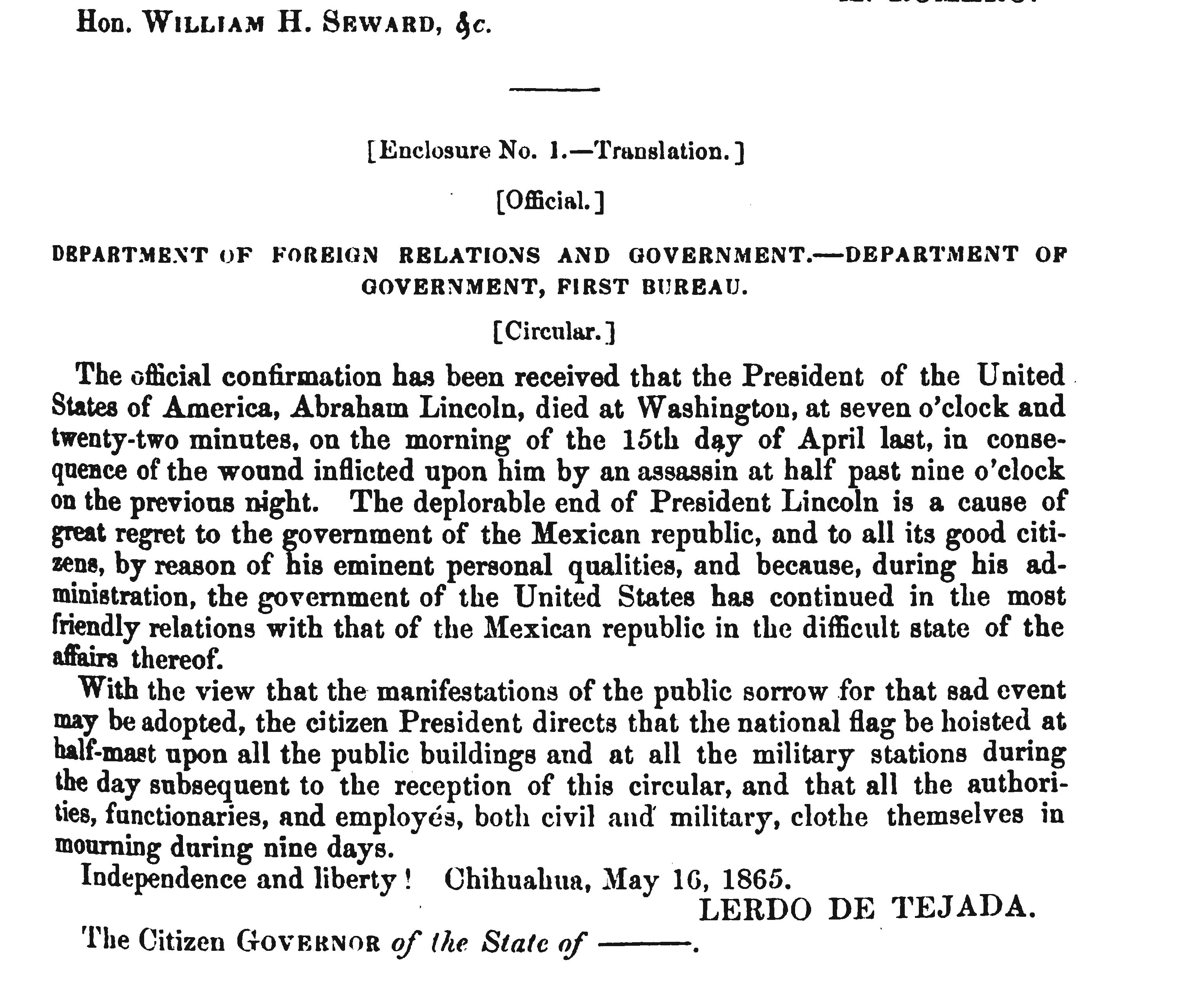
-
Description
In this official letter from the exiled Mexican government, Sebastián Lerdo de Tejada, the minister of foreign affairs, notifies the United States of their remorse for the death of President Abraham Lincoln. The letter says the Mexican government will fly flags at half mast and wear mourning attire for nine days to honor Abraham Lincoln. Lerdo de Tejada served as second in command to exiled Mexican President Benito Juarez during the "French Intervention" which began in 1861. The French, backed by conservatives and nobility in Mexico, tried to overthrow Mexican President Benito Juarez. Juarez set up his government in exile in northern Mexico, in Chihuahua City, and eventually won the war in 1867.
-
Source
Google Books
-
Rights
This item is in the public domain and may be reproduced and used for any purpose, including research, teaching, private study, publication, broadcast or commercial use, with proper citation and attribution.
-
Creator
Sebastián Lerdo de Tejada
-
Publisher
Government Printing Office
-
Date
May 16, 1865